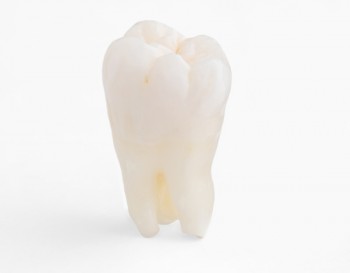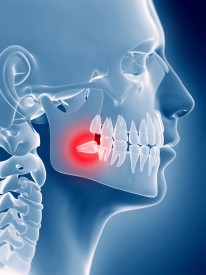Wisdom Teeth

Overview
Wisdom teeth are the name given to any one of the four third molars. These molars took on the nickname wisdom teeth because people typically get them around the ages of 17 to 25, or when a person is “wiser.” Wisdom teeth can be useful assets to your mouth if they are healthy and properly aligned, but in many cases misaligned third molars run the risk of doing more harm than good. It is always a good idea to consult your dentist to see if a wisdom tooth extraction is a good idea for you.
Risk Factors of Having Wisdom Teeth
Depending on the alignment of your teeth, you may have room for these third molars to grow in. However, there are many risks involved if you don’t get your wisdom teeth extracted:
- Without an extraction you run the risk of having an abscessed tooth
- Poorly positioned wisdom teeth could throw your teeth out of alignment
- Infections could occur
- Your gums could become damaged
Signs of Trouble
While the best way for your dentist to determine if you need wisdom teeth extracted is through x-rays, you may want to consider getting a check-up if you experience any of the following:
- Gradually increasing pain at the back of your mouth could indicate third morals growing in sideways or misaligned as they will press on nerves and bone
- Any pain, redness, tenderness or swelling around the back area of the mouth could indicate an infection brought upon by bacteria that has entered through the open tissue of wisdom teeth that have partially erupted from your gums
- Foul breath, bad taste can be a sign of an infection that has been caused by an impacted wisdom tooth
Procedure
Depending on the state of the tooth, your dentist will determine if you need a general extraction or oral surgery.
General Extraction
If your tooth has fully erupted from your gums, then we can typically perform an extraction without surgery.
- Under very effective local anesthesia, your tooth can be loosened and pulled with little to no pain.
- Light stitching may be necessary to close the opening, but it isn’t always required.
There is a possibility that your tooth could be impacted, meaning that it won’t erupt from your gums in a complete piece. These instances might require oral surgery, but the procedure is very similar to an extraction.
Surgical Extraction (Oral Surgery)
If a general extraction is not possible, it will be necessary to create an incision in your gums and facilitate the removal of any impacted teeth. It is a slightly more complex procedure that will take a little bit more time. While undergoing a surgical extraction is still relatively painless with local anesthesia, you may talk to your dentist about the possibility of general anesthesia to quell anxiety.
- After the application of the anesthesia, a small incision is made into the gum to provide access to the tooth – in some cases some tissue from the jawbone that holds the tooth may need to be removed
- The impacted tooth is then cut into pieces and carefully removed
- Once the extraction is complete, the incision is closed with sutures
- Depending on your treatment plan, the sutures may dissolve after some time or a follow-up visit may be required for the stitches to be removed
Post-Op Care
Before and after either procedure, your dentist will discuss with you the treatment and any follow-up maintenance that must be done on your end to prevent infection and facilitate effective healing. Abstinence from smoking for a day or two after surgery is highly recommended, as well as activities that have the potential to loosen blood clots, like drinking through a straw or rinsing.
All options and instructions will be detailed for you in a very precise and informative manner when the time comes.
In rare circumstances, a few complications may occur after the procedure, you will want to contact your dentist if you experience any of the following:
- Dry socket: usually dry socket will heal on its own, but it’s always a good idea to let your dentist know so they can help you quicken the healing process and make sure you’re not at risk for infection
- Nerve injury: Certain nerves run near the surgical site that supply sensation and taste to the area. Some nerve injuries are temporary, but, like dry sockets, they should be brought to the attention of your dentist immediately.
- Damage to prior dental work: if you notice that your procedure has affected any prior work that has been done to your teeth it is a good idea to have it repaired as soon as possible
- Damage to surrounding areas: In very rare circumstances the surgery might have caused some injury around your sinus cavity or jaw. Any strange, outstanding pain should be treated as a medical emergency



